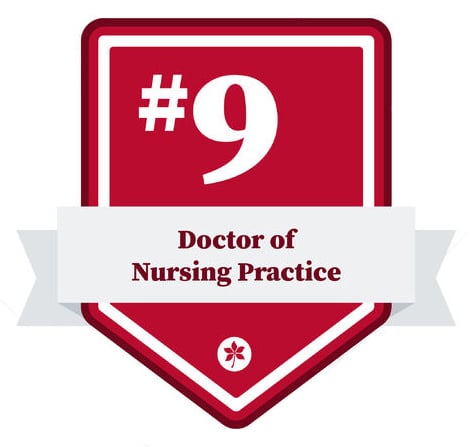BSN to Doctor of Nursing Practice – Family Nurse Practitioner

March 1, 2026
August 25, 2026
Become an FNP with this accredited online DNP program
Reach the highest level of clinical expertise as a Family Nurse Practitioner (FNP) with a BSN to Doctor of Nursing Practice degree online. Ohio State’s online DNP to FNP program positions nurses as leaders ready to provide the best health care for families and individuals across the lifespan and in a variety of situations.
The comprehensive clinical experiences and 100% online coursework in this online FNP program, accredited by Commission on Collegiate Nursing Education (CCNE), will prepare you to develop, implement, and assess nursing strategies in clinical settings ranging from private practices and clinics to managed care organizations and governmental agencies. You will earn both you MSN and DNP degree as part of this online program.
Upon graduating from this program, you are eligible to sit for the FNP national certification exam.
Frequently Asked Questions
Yes! Ohio State offers an online, top-ranked BSN to DNP program with six advanced practice specialty areas, allowing you to customize your educational experience to align with your passions and clinical aspirations.
Yes, earning your DNP is a key step toward advanced leadership and expertise in evidence-based practice. Click here to learn more.
If you have a BSN and are ready to pursue your DNP, you can choose from six online specialty tracks at Ohio State, specializing in FNP, Neonatal NP, Nurse Anesthesia, Pediatric Acute Care NP, Adult-Gerontology NP, or Psychiatric Mental Health NP. If you have your MSN, Ohio State offers two Post-Master’s DNP pathways – one focused on clinical expertise and the other on executive leadership.
An online Doctor of Nursing Practice (DNP) prepares nurses for advanced leadership roles in clinical practice, administration, education, and healthcare policy. Click here to learn more.
Official Recognition & Accreditation

Top 10 program
The Ohio State University’s DNP program was ranked #9 in the country by U.S. News & World Report in 2025.

Accreditation
Ohio State’s Doctor of Nursing Practice program is accredited by the Commission on Collegiate Nursing Education (CCNE).
Related Content
Related Content

Advancing care: Chris’s journey as a BSN to DNP-FNP graduate
Discover why Chris chose Ohio State’s online BSN to Doctor of Nursing Practice program and what he plans to do next.

What can you do with an online DNP?
Learn what you can do with an online DNP degree and discover the role of a Nurse Practitioner.

Is pursuing an online DNP worth it?
Learn about Ohio State’s top-ranked online DNP programs and the value they add to your career.
Academic Calendar
Ohio State’s online BSN to FNP doctorate program admits online students once-per-year for the Autumn semester.
Academic Calendar
Ohio State’s online BSN to FNP doctorate program admits online students once-per-year for the Autumn semester.
Admission Criteria
Applications to this online FNP program will be reviewed using a holistic approach, meaning all aspects of who you are as an applicant will be considered. This assessment will include academic preparedness and formative experiences in your professional background, education and life. Applicants for the online BSN to DNP – Family Nurse Practitioner program must have the following:
Applicants must have a completed Bachelor of Science in Nursing or a Master of Science in Nursing. Nursing degrees must be from an institution with a nursing education program accredited through the CCNE, ACEN, or CNEA. If you are currently working toward earning your degree, you must receive the required nursing degree by August 1 prior to beginning enrollment in this online BSN to DNP program.
You must have an active, unencumbered license as a registered nurse in the state where you practice.
GPAs are reviewed by Ohio State’s Graduate and Professional Admissions Office. Applicants whose GPAs fall below 3.0 may still apply and be considered for admission.
Applicants must complete a college-level statistics prerequisite course before the posted application deadline, with a grade of B- or higher. Courses that are in progress at the time of the deadline do not meet this requirement, and applicants in this situation will not be considered for admission. The course must have been completed within five years of the application deadline. Credit by examination (such as AP test scores) is not accepted towards the prerequisite requirement. The prereq course should include a review of basic statistical concepts, univariate statistical analysis, bivariate statistical analysis and commonly used statistical tests.
For prerequisite coursework taken at another institution, please visit the Transferology website to see if the courses that you have taken or plan to take at another institution qualify. If you are unable to find results through these tools, then an evaluation of the courses will need to be done by the Office of Graduate & Professional Admissions.
The following Ohio State courses fulfill the prerequisite requirement:
- STATISTICS 2450 Introduction to Statistical Analysis
- PSYCH 2220 Data Analysis in Psychology
- PSYCH 3321 Quantitative and Statistical Methods
- PUBHIBO 6210 Applied Biostatistics I
- STATISTICS 1350 Elementary Statistics
- STATISTICS 1450 Introduction to the Practice of Statistics
To apply, applicants must reside in an authorized state. Please scroll to the State Authorization section of this page for more details.
Who We Are Looking For
Your application will be reviewed using a holistic approach, meaning all aspects of who you are as an applicant will be considered. This assessment will include academic preparedness and formative experiences in your professional background, education and life. We are also looking for candidates that demonstrate a preferred set of attributes, experiences and strengths described in the following list. This list is not all encompassing, but is meant to help guide you in what you may wish to highlight in your written application materials and in your recorded online video interview:
- Clear understanding of the role of a DNP, your goals for the future and an alignment between the two
- Clear understanding of the specialty track to which you are applying
- Experience with evidence-based practice (EBP), quality improvement, research, innovation and scholarship (including publications, presentations or posters)
- Any experience with the relevant populations of your chosen specialty
- Demonstration of leadership, interprofessional collaboration and teamwork
- Evidence of resiliency, the ability to overcome obstacles, to think critically and evidence of growth
- Community engagement, local to global, and a diversity of thought, perspective and experience
- Written and oral communication skills, organization of ideas, emotional intelligence
- Personal attributes such as humility, professionalism, compassion, etc.
- Overall commitment to nursing
How to Apply
Students must complete the following steps outlined below by the application deadline. Most applicants may review the status of their application any time at appstatus.osu.edu. Failure to complete all required steps of this application process by 11:59 pm ET on the day of the posted deadline will result in your application not being considered for admission, with no exceptions.
You can complete an application online for the next available Autumn cohort at The Ohio State University Graduate and Professional Admissions office’s website. A non-refundable $60 application fee is required at the time of submission of the application.
Additional information for internationally educated applicants can be found on Ohio State’s Graduate and Professional Admissions website for international applicants.
Applicants must submit official transcripts from all colleges and universities you have previously attended at either the undergraduate or graduate level. This includes transcripts for any post-secondary courses taken during high school or coursework that appears as transfer credit on another transcript. Transcripts from The Ohio State University do not need to be submitted. Transcripts should be submitted directly by the sending institution by mail or electronic transfer to be considered official. Please request your transcripts be sent early so they arrive before the deadline. Transcripts can be sent to gpadocs@osu.edu or the following address:
The Ohio State University
Graduate Admissions Office
P.O. Box 182004
Columbus, OH 43218-2004
Unofficial transcripts: Applicants may upload a scanned copy of an official transcript, diploma, or degree certificate at the time of application through the Admissions Uploader. Documents submitted in this manner help form a complete application packet, but they do not replace the need for official documents. Web-based documents, online grade reports, advising reports, unofficial transcripts or scans labeled “UNOFFICIAL,” documents with a URL across the top, and transcripts missing the institution’s name, seal, stamp, or GPA will not be accepted. If an applicant is admitted, they will be required to supply official transcripts. Exception: You do not need to submit transcripts for coursework or degrees earned from The Ohio State University.
For more details regarding these methods of submitting transcripts, please visit The Ohio State University Graduate and Professional Admissions office’s website.
Your resume or curriculum vitae (CV) should be in a similar format to what you would use for a job application. You should include your previous education, professional experiences and any community service, volunteer activities, publications, research and leadership experiences on your resume or CV. You may submit this document at the time of application or after by way of the Admissions Uploader.
Please upload a purpose and goals statement, including a narrative of your professional experience, career goals and match to the goals of DNP education. In this statement, applicants should address the following:
- What advanced practice specialty are you selecting and why? Please include rationale for selecting the specialty and how becoming advanced practice certified in the chosen specialty will assist you in achieving your professional and educational goals.
- What specifically are your academic and career goals for which the DNP program will prepare you best?
- How have your life experiences prepared you for being a doctoral-prepared nurse?
- Why are you seeking education in the DNP program at this time in your career?
The statement should address each of the above questions and will act as a demonstration of your writing skills to the program faculty. The response is not to exceed three single-spaced pages. Consideration will be given to both the quality of your writing and the congruence between the stated goals and those of the program. You may submit this document at the time of application or after by way of the Admissions Uploader.
You are required to complete a recorded online video interview through an online portal called HireVue, during which you will be recorded answering a brief selection of questions regarding your interests and goals in nursing and the DNP program. This interview can be completed at any time during the application window. However, we ask that you do so only after you have completed and submitted your application. Note: You must complete the recorded online video interview before the application deadline. For further details, instructions, and links to the online portal go to the interview.
During the application you will be asked to provide the names and email addresses of three (3) recommenders. Once the application is submitted, an email will be automatically generated and sent to your recommenders with a link and further instruction on how to submit their letters of recommendation. We encourage you to submit your application far in advance of the deadline so that your recommenders have ample time to upload their letters.
Letters of recommendation should be submitted from individuals who are familiar with your academic ability, professional experience and potential to succeed in the highest level of nursing practice. We suggest providing your recommenders with information on the degree and specialty to which you are applying and with a copy of your purpose and goals statement. Ask that they address your potential for success in a rigorous graduate program and what attributes and experiences they feel will allow you to excel as an advanced practice nurse in your chosen specialty. Finally, make them aware of the submission process and the application deadline by which they must submit their letters.
Details regarding what English Proficiency tests are acceptable, the scores required, and how to submit scores may be found on The Ohio State University Graduate and Professional Admissions office’s website.
If you completed the equivalent of a bachelor’s degree or higher at an institution outside of the United States, you must submit a course-by-course credential evaluation that verifies U.S. degree equivalency and includes a cumulative Grade Point Average (GPA) on a 4.0 scale.
The evaluation must be completed by an approved credential evaluation agency and sent directly to the university by the agency. Our preferred agency is TruMerit (formerly CGFNS International) as TruMerit credential evaluations are also required by the Ohio Board of Nursing for RN licensure. We will also accept evaluations from the following approved agencies:
- World Education Services (WES)
- SpanTran (The Evaluation Company)
- Educational Credential Evaluators (ECE)
- International Education Evaluations (IEE)
- Josef Silny & Associates (JS&A)
- International Education Research Foundation (IERF)
- International Consultants of Delaware (ICD)
The course-by-course credential evaluation must include:
- Verification of U.S. degree equivalency
- A list of completed coursework with credit hours and grades
- Calculation of a cumulative GPA on a 4.0 scale
If you are currently or have been previously enrolled in a degree-granting graduate program at The Ohio State University for any length of time, you would be considered a Graduate Intra-University Transfer Student. Be sure to choose the appropriate application for “current or former” Ohio State students after following the Apply link found here. In addition to that online application, you must complete a Supplemental Application. This separate application must be submitted to the College of Nursing directly at CON-gradrecords@osu.edu.
Admission Timeline
All required materials listed above must be submitted by the posted application deadline to be considered for admission. Please allow up to five business days for the status of materials to be updated on your application status webpage.
You are not able to defer admittance. If you are unable to begin your studies in the term to which you applied, you will be required to reapply in the future.

The Ohio State University participates in the State Authorization Reciprocity Agreements (SARA).
SARA is a national initiative that increases student access to distance education courses and programs while maintaining compliance with state regulations. Institutions participating in SARA can offer educational opportunities in all 49 SARA member states, the District of Columbia, the U.S. Virgin Islands and Puerto Rico without seeking individual approval in each state.
California is not a SARA member state, however, OSU may offer online courses and programs to students located in California under the California Private Post-Secondary Act of 2009.
The Application Process
Once you understand your program’s admission criteria, please note the application deadline. You’ll need a quiet space and a variety of materials for your application. To learn more, please see our Admissions page for the full process. Ready to Apply? Find your application here.
Career Outlook
What can you do with a Family Nurse Practitioner DNP degree?
With a Family Nurse Practitioner (FNP) DNP degree, you can provide advanced clinical care across the lifespan, diagnose and treat a wide range of health conditions, and play a pivotal role in primary and specialty care settings. This doctorate degree also equips you to take on leadership roles in healthcare policy, education, and administration, enhancing patient outcomes and driving healthcare innovation.
The national demand for advanced clinical and leadership competencies is underscored by Nurse Practitioner being ranked the No. 1 profession in U.S. News & World Report’s annual Best Jobs list for the third consecutive year.
Top Occupations by Median Income
What They Do
Diagnose and treat acute, episodic, or chronic illness, independently or as part of a healthcare team. May focus on health promotion and disease prevention. May order, perform, or interpret diagnostic tests such as lab work and x rays. May prescribe medication. Must be registered nurses who have specialized graduate education.
Work Activities
Maintain complete and detailed records of patients' health care plans and prognoses. Develop treatment plans, based on scientific rationale, standards of care, and professional practice guidelines. Provide patients with information needed to promote health, reduce risk factors, or prevent disease or disability.
Wage Range
- Entry Level: $97,960
- Mid Level: $129,210
- Senior Level: $169,950
Job Outlook
Bright
Projected Growth
46.3%
Related Careers
- Advanced Practice Psychiatric Nurses
- Clinical Nurse Specialists
- Emergency Medicine Physicians
- Family Medicine Physicians
- Registered Nurses
Job Sectors
- Medicine and Dentistry
- English Language
- Biology
- Psychology
- Customer and Personal Service
National occupational information in Ohio State Online’s Career Outlook tool is sourced from O*NET Online and the U.S. Bureau of Labor Statistics (BLS). The median annual wage displayed to the right of each occupational title above is based on the BLS Employment Projections program. Outlook and percent change indicate projected growth or decline over the next 10 years.
Curriculum
Ohio State’s DNP Family Nurse Practitioner program curriculum allows students to apply theory and evidence in practice with individuals and families in advanced practice nursing roles. This online FNP program meets the nurse practitioner curriculum guidelines of the National Organization of Nurse Practitioner Faculties (NONPF) Advanced Nursing Practice: Curriculum Guidelines and Program Standards for Nurse Practitioner Education and the American Association of Colleges of Nursing (AACN) Essentials of Master’s Education.
Below is a sample curriculum plan for part time students of Ohio State’s online BSN to DNP – Family Nurse Practitioner track. Please note: a part-time plan may include as few as 4 credit hours in one semester and up to 13.5 credit hours in another, depending on the required sequencing of courses and clinicals.
On-campus requirements: Online students are required to attend 2 day on-campus visits during the last three semesters of their program for in-person learning and evaluation of clinical skills. These required on-campus learning days will be pre-scheduled so students can make travel plans in advance.
Required clinical hours: Students are required to complete a total of 675 clinical hours during the program.
Autumn, Year 1
This course focuses on methods, application and interpretation of data and epidemiological approaches for evidence-based nursing practice.
Explore the theoretical foundations and application of quality improvement methods, tools and strategies needed to increase organizational effectiveness. Focuses on measurement and accountability in health care delivery systems through the examination and analysis of data, structures, processes, and outcomes. Prepares students to lead and practice in organizations.
Development of scholarly writing and peer review skills in scholarly nursing practice. Prereq: Enrollment in DNP program, or permission of instructor.
This course immerses students into the knowledge, principles & skills of evidence-based practice (EBP) integral to preparing the DNP for mentoring & leading EBP in advanced practice settings & in healthcare systems. The content places strong emphasis on the initial steps of the EBP process from organizational assessment & problem identification through making recommendations based on evidence.
Spring, Year 1
Critical analysis of population-based factors that impact population and personal health care including how structural racism and the social determinants of health contribute to health disparities and how health behavior theories, framework, and evidence-based strategies lead to improvements to community health outcomes.
Explore the theoretical foundations and application of quality improvement methods, tools and strategies needed to increase organizational effectiveness. Focuses on measurement and accountability in health care delivery systems through the examination and analysis of data, structures, processes, and outcomes. Prepares students to lead and practice in organizations.
Examination of policymaking at the system, local, state, and federal levels to influence evidence-informed policy change affecting health care.
An Evidence-based Program to Reduce Stress and Promote Overall Well-being
Through a series of educational and skills building activities, this course provides an evidence-based program that reduces stress, improves mental resiliency and builds protective factors that improve overall health, well-being, and academic performance.
Summer, Year 1
This course will apply information and communication technologies and informatics processes to nursing practice. It will address skills needed to assess, evaluate, and optimize health information systems/technology to support communication, the delivery of high-quality care, and improvement of population health. These components emphasize the design and implementation of health care technology.
Examination of leadership styles to develop and maximize the DNP leader’s role and interprofessional collaboration among diverse teams to positively impact health outcomes. Focus on theories and principles of communication, leadership, interprofessional collaboration, change management, role development and systems thinking.
Autumn, Year 2
Analysis of theories and research regarding alterations of health states across the life span with an emphasis on pathophysiological processes.
Exploring healthcare economics and finance for the DNP.
Spring, Year 2
Development of advanced health assessment skills. Emphasis on acquisition of pertinent assessment data across the life span for advanced nursing care for multiple specialties.
Pharmacokinetic principles and clinical application and principles of the use of drugs and therapeutic devices in the prevention of illness and maintenance of health. Meets criteria for APN’s prescribing in Ohio.
Summer, Year 2
Focus on primary healthcare of individuals and families across the life span. Emphasis on integration of scientific foundations, social determinants of health, and interprofessional leadership to manage complex healthcare needs of patients.
Analysis of theories and research regarding alterations of health states across the life span with an emphasis on pathophysiological processes.
Autumn, Year 3
Focus on primary healthcare of individuals and families across the life span. Emphasis on integration of scientific foundations, social determinants of health, and interprofessional leadership to manage complex healthcare needs of patients.
Spring, Year 3
Focus on primary healthcare of individuals and families across the life span. Emphasis on integration of scientific foundations, social determinants of health, and interprofessional leadership to manage complex healthcare needs of patients.
Application, integration and synthesis of knowledge, skills, and abilities to meet AACN Essentials for Advanced-Level Nursing Education sub-competencies with practice experiences designed to help students achieve competencies in the specialty components of the DNP role.
This course will prepare APRN students for transition to advanced nursing practice at the DNP level and provide application of evidence-based practice knowledge, skills, and abilities for advanced practice nurses in the care of specialty population.
Summer, Year 3
Development of scholarly writing and peer review skills in scholarly nursing practice.
Application, integration and synthesis of knowledge, skills, and abilities to meet AACN Essentials for Advanced-Level Nursing Education sub-competencies with practice experiences designed to help students achieve competencies in the specialty components of the DNP.
Autumn, Year 4
Application, integration and synthesis of knowledge, skills, and abilities to meet AACN Essentials for Advanced-Level Nursing Education sub-competencies with practice experiences designed to help students achieve competencies in the specialty components of the DNP role.
Students complete a scholarly clinical project based on their individualized goals and interests.
What are some examples of final project ideas completed by DNP students?
Example 1: Young children in the child welfare system often experience adverse childhood experiences (ACEs) that can negatively impact brain development and social–emotional growth. Because of this, early identification of social–emotional delays and timely referrals for treatment are crucial. This quality improvement pilot project introduced a social–emotional screening protocol designed to provide a trauma-informed approach to recognizing delays and addressing the effects of trauma in young children involved in child welfare services.
Example 2: This quality improvement project introduced a restrictive packed red blood cell (PRBC) transfusion policy in a level IV NICU to improve consistency in caring for very low birth-weight infants. Pre- and post-implementation data showed no major change in the number of transfusions or in rates of necrotizing enterocolitis (NEC) or intraventricular hemorrhage (IVH). However, the policy led to better communication among providers and more consistent documentation, supporting sustainable improvements in patient care. Continued monitoring may reveal longer-term effects on transfusion practices and clinical outcomes.
Spring, Year 4
Application, integration and synthesis of knowledge, skills, and abilities to meet AACN Essentials for Advanced-Level Nursing Education sub-competencies with practice experiences designed to help students achieve competencies in the specialty components of the DNP role.
Students complete a scholarly clinical project based on their individualized goals and interests.
What are some examples of final project ideas completed by DNP students?
Example 1: Young children in the child welfare system often experience adverse childhood experiences (ACEs) that can negatively impact brain development and social–emotional growth. Because of this, early identification of social–emotional delays and timely referrals for treatment are crucial. This quality improvement pilot project introduced a social–emotional screening protocol designed to provide a trauma-informed approach to recognizing delays and addressing the effects of trauma in young children involved in child welfare services.
Example 2: This quality improvement project introduced a restrictive packed red blood cell (PRBC) transfusion policy in a level IV NICU to improve consistency in caring for very low birth-weight infants. Pre- and post-implementation data showed no major change in the number of transfusions or in rates of necrotizing enterocolitis (NEC) or intraventricular hemorrhage (IVH). However, the policy led to better communication among providers and more consistent documentation, supporting sustainable improvements in patient care. Continued monitoring may reveal longer-term effects on transfusion practices and clinical outcomes.
Program Faculty
While taking the next step in their nursing careers in this BSN to FNP online program, students will learn from and collaborate with world-class faculty and peers from across the country.

Heidi Bobek, DNP, APRN-CNP
Dr. Heidi Bobek is an Assistant Clinical Professor and the specialty track director for The Ohio State University College of Nursing’s Family Nurse Practitioner program.
Janis Brewer, DNP, APRN-CNP
Clinical Assistant Professor of Practice
Jennifer Dush, PhD, APRN-CNP
Assistant Clinical Professor
Monica Lee, DNP, APRN-CNP
Assistant Clinical Professor
Alendré McGhee, DNP, APRN-CNP
Clinical Assistant Professor of Practice
Matthew Newcomer, DNP, APRN-CNP
Clinical Assistant Professor of Practice
Katie Roll, DNP, MSN, RN, APRN-CNP
Clinical Assistant Professor of Practice
Randee Masciola, DNP, APRN-CNP, WHNP-BC, FAANP
Associate Clinical Professor, DNP Program Director
Testimonials
See what graduates and students of the online FNP program are saying about it.
Tuition fees are subject to change. The table above serves as a guide and not an official bursar’s bill. Full-Time costs are total tuition costs per semester.
Financial Aid Resource
Financial Aid Resource
Related Articles
Related Articles

How to ask your employer for tuition reimbursement
How to Pay for Your Online Program

Tips for Online Learning from Ohio State Students and Faculty
Get Started
Connect with a knowledgeable Enrollment Advisor who can help answer your questions and explain different aspects of the more than 80 online degrees and certificates offered at Ohio State. They are here to help you on your education journey.





